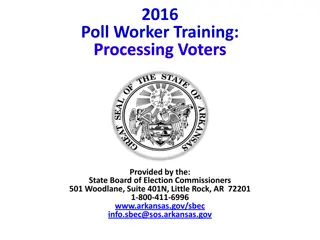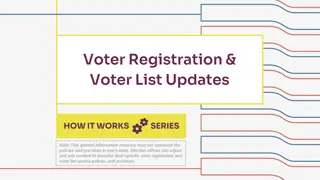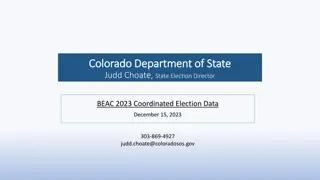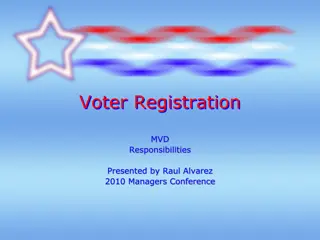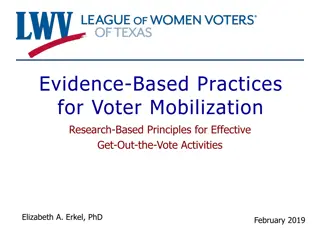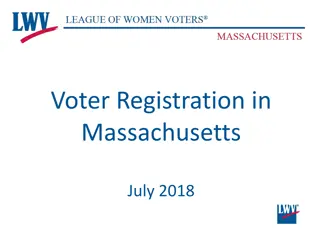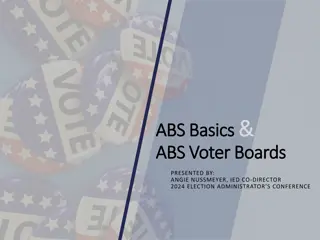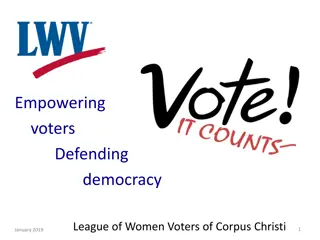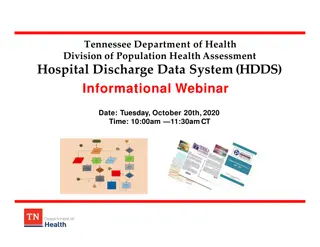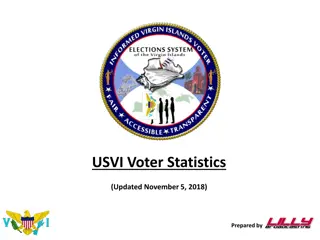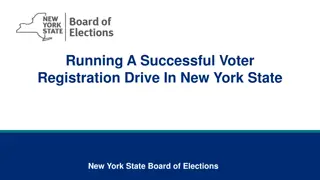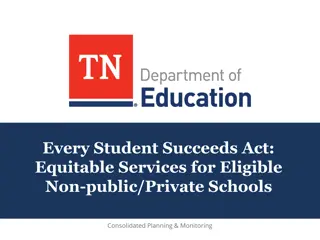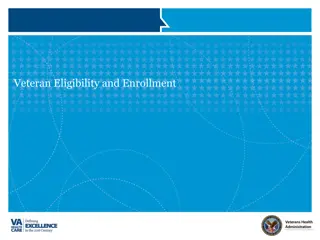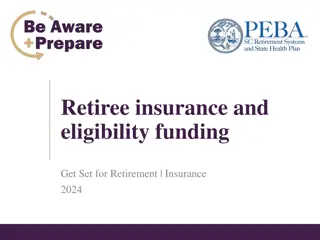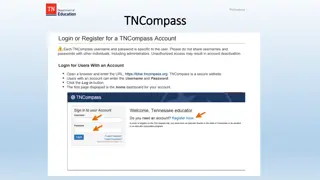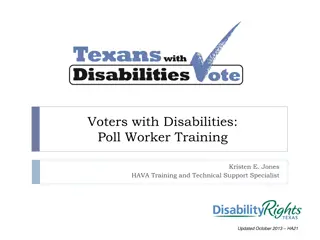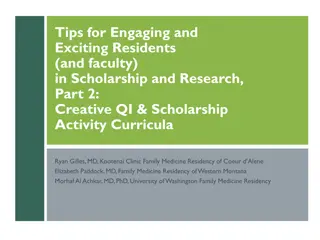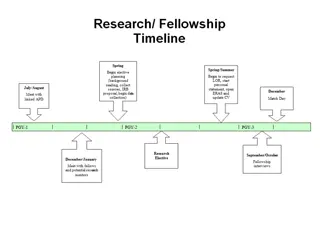Voter Eligibility and Residency Guidelines in Tennessee
This informative text outlines the voter eligibility requirements in Tennessee, including citizenship, age, and residency criteria. It also details the factors considered for determining residency, addresses special considerations for homeless voters, and explains the process for registering to vote and receiving mail-in ballots. The guidelines aim to ensure that all eligible Tennessee residents can participate in elections effectively.
Download Presentation

Please find below an Image/Link to download the presentation.
The content on the website is provided AS IS for your information and personal use only. It may not be sold, licensed, or shared on other websites without obtaining consent from the author. Download presentation by click this link. If you encounter any issues during the download, it is possible that the publisher has removed the file from their server.
E N D
Presentation Transcript
The Voting Process in Tennessee Part of Civics Lesson Plan by William Freddy Curtis Source: Tennessee Secretary of State, Division of Elections website
Voter Eligibility To be eligible to vote in Tennessee, you must be - a citizen of the United States - (18) years of age or older on or before the date of the next election - a resident of Tennessee View Guidelines for Determining Residency and special considerations for Homeless Persons Residency and Non-resident Property Owners. In order to participate in an election, a qualified voter must be properly registered no later than thirty (30) days before the election. The election commission office will process any by-mail voter registration form that has been postmarked at least thirty (30) days before the election. T.C.A 2-2-109.
Guidelines for Determining Residency To determine whether a person is a resident of Tennessee for purposes of voter registration, the administrator of elections must consider the following factors. The residence of a person is the place where the person s habitation is fixed and is where, during periods of absence, the person definitely intends to return. A person can have only one residence. A change of residence is made not only by relocation, but also by intent to remain in the new location permanently, and by demonstrating actions consistent with that intention. The following factors may be considered: The person s possession, acquisition or surrender of inhabitable property; Location of the person s occupation; Place of licensing or registration of the person s personal property; Place of payment of taxes which are governed by residence; Purpose for a person s presence in a particular place; and Place of the person s licensing for activities such as driving. The place where a married person s spouse and family live is presumed to be that person s residence, unless that person takes up or continues abode with the intention of remaining in a place other than where the spouse and family reside. No person gains or loses residency solely by presence in or absence from the state while employed in the service of the United States or this state, or while a student at an institution of higher learning, or while kept in an institution at public expense.
Homeless Persons Residency In order to register to vote in Tennessee, a person does not have to live in a building. Instead, a person who finds himself or herself homeless must describe where the person usually stays or returns to when absent. This location may be the address of a shelter where the person stays or frequents, or it may be the description of a street corner where the person may often rest. A physical description of the location must be given so that the election commission knows in which voting precinct to place the person. T.C.A. 2-2-122. The election commission must mail voter registration cards to people who register to vote by mail. Therefore, if a homeless person tries to register to vote by mail using an address where the person does not get the mail, the person will have to give a mailing address where he or she can receive mail. For example, a homeless voter may be able to use a shelter as a mailing address or the address of a family member or friend who agrees to receive the mail. Another option is to use General Delivery as a mailing address. However, please note that absentee ballot materials may not be mailed to general delivery. T.C.A. 2-2-115 and T.C.A. 2-6- 202. If the voter registration card is returned as undeliverable to the election commission, the voter will be mailed a confirmation notice and placed on inactive status. T.C.A. 2-2-115. In addition, like all registered voters, a homeless person should let the county election commission know when there are any changes to the mailing address or address where the person is registered to vote.
How to Register to Vote Online at GoVoteTN.com You can download and complete the Voter Registration Application and mail the application to your county election commission. Also, you may pick up voter registration applications in person at the following locations: County Election Commission Offices County Clerk s Offices Public Libraries Register of Deeds Offices or during a transaction with one of the following agencies: Department of Health (WIC program) Department of Human Services Department of Intellectual and Developmental Disabilities Department of Mental Health Department of Safety (motor vehicles division) Department of Veteran s Affairs
County Election Commissions http://tnsos.org/elections/election_commissions.php
What Is Voting Like? https://www.youtube.com/watch?v=LVkIsLyaz6w
Voting on Election Day Absentee Ballots: What if you are not in the county you live in on Election Day? http://sos.tn.gov/products/elections/absentee-voting#2 Early Voting: To vote early, a person must appear in person at either the county election commission office or at a satellite voting location opened by the county election commission. The early voting period typically begins twenty (20) days before an election and ends five (5) days before an election. Although closed from voting on holidays, a person may vote early on any Saturday that falls during this time frame. In those instances in a city election where there is not any opposition on the ballot, there shall be no early voting period. There are many advantages to voting early, namely being able to choose a day during the early voting period that best fits the voter s schedule and the voter being able to change his or her address of registration and vote in the same voting location. For details regarding times and early voting locations, a person must contact your local county election commission office.
Why Your Vote Matters Watch this video! https://www.youtube.com/watch?v=6BiqdXF9wNw


